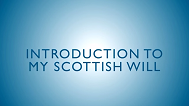Online Scottish Wills in Scotland
Jargon - What Does That Word Mean in Scottish Law?
The Law uses a lot of jargon. Some legal words are listed below. If the word you want is not here please send me an email and I will reply as well as add it to the list.
Please note that these are not meant to be full legal definitions - just a brief guide.
Click on the first letter of the word you are looking for.
A B C D E F G H I J K L M N O P Q R S T U V W X Y Z
Adoption - a legally adopted child has rights of inheritance in the estate of his or her adoptive parent(s) but not in the estate of his or her natural parent.
Beneficiary - someone who inherits something because of a will
Civil Partner - someone with whom you have registered a same sex Civil Partnership under the Civil Partnership Act 2004.
Cohabitee - someone living with another as man and wife but unmarried.
Domicile - your domicile is where you
believe that your home is and, if you are not there now,
where you intend, eventually, to return.
You might live temporarily - or even for extended periods
of years - away from your domicile but if your intention
is to return you retain that domicile.
Once you have decided to settle permanently in another
country your domicile changes.
Estate - what you own when you die.
| Types of Property | |
| Heritable Estate | Moveable Estate |
| Land,buildings,etc | Anything else - including money,shares, share in a business partnership |
Executor/Executrix - the person entrusted by you in your Will to ensure that your wishes are carried out. The Executor has the authority of law to gather in your Estate and distribute it to those entitled to it.
Guardian - A guardian is someone whom
you name with a view to that person assuming parental
responsibilities and rights in the upbringing
of your child/children after your death.
Parental rights are automatically granted to married
parents by law but can be acquired by others, such as the
father of illegitimate children by court application or
by an agreement between mother and father on a special
form which is formally recorded in the official Register.
If you have children under 16 when you die and your
children do not have anyone else with parental rights
then the guardian will be entitled to take charge of the
children. Normally, unless your choice of guardian is
questionable and/or the child is in danger, the courts
and/or Local Authority will not interfere.
Of course, if someone else, other than the person you
name, wishes to have the children it is open to them to
take court action and the matter would then be decided by
the Judge. Your wishes would be a significant factor in
the Judge's mind.
It is sensible to make sure that the person you name is
willing!
Heritable - See Estate for more information
Intestacy - Click here for more information.
Inheritance tax
See our FAQ page about inheritance tax
In specie - If one of your beneficiaries wants an item of your estate (e.g. a clock, instead of money) then it is said that the beneficiary wants to take part of his legacy "in specie". If the clock is not left specifically to someone in the Will, it is for the Executor to decide if this is ok.
Legacy - a gift made in a will
Legatee - a person who receives who receives a Legacy
Moveable - See Estate for more information
Partner - This word is used in a number of circumstances. It could be a love partner or cohabitee. It could be a business partner in a business partnership. Or it could be a civil partner.
Per stirpes - When you leave everything to your children you will not want to have to change your Will if any die before you. One option is to arrange that the legacy will go to your grandchildren. A 'per stirpes' arrangement means that grandchildren receive what their parents would have received, in equal shares.
Residue - refers to "the rest of your estate". The clause dealing with this comes at the end of the will and covers everything else that you own and that you haven't already given away in earlier parts of the will.
Residuary Beneficiary - one of the people who will share in the residue.
Spouse - a married partner - not a Cohabitee
Survivorship - if you bought any
heritable property in joint names then it is quite
possible that you have entered into a contract (by dint
of the wording of the deed) with the person concerned
that you will hold the property "jointly and to the
survivor". This means that when one of you dies the
other receives the property irrespective of what any Will
may say.
If this is not what you want you must see a Solicitor
immediately as well as making a Will now.
Testator/Testatrix - This means the man/woman who makes a Will.
Trust - if you leave any property 'in trust' for one of your beneficiaries then that property will be looked after for them. They will get it one day (often when they reach a certain age) but until then they cannot get access to it without the approval of the Trustees.
Trustee - The person or person who look after the property that is held in trust. The trustee is not allowed to do anything with the property unless the Will allows it and the Trustee owes duties to the beneficiary concerned.
Will - a document setting out a person's wishes regarding the disposal of his or her property after death.
Make a Will Online in Scotland
Website by Digital Routes Ltd | © Collette de Wert SM







